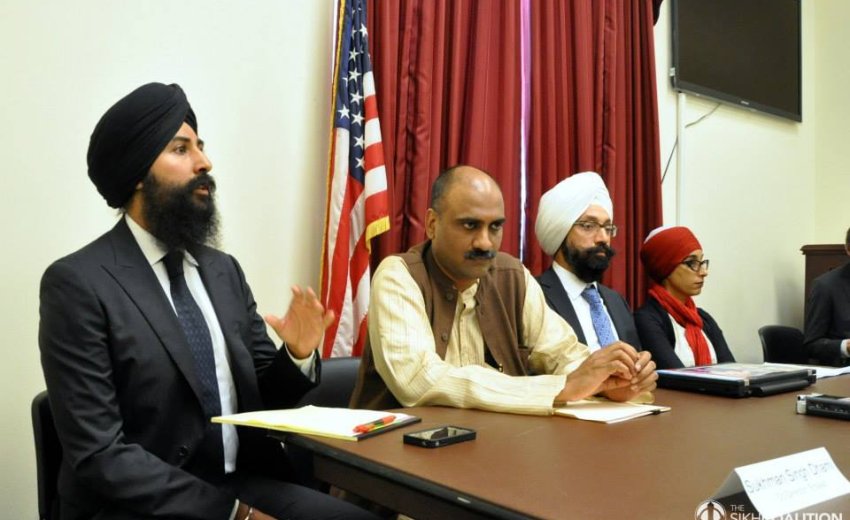October
1, 2014 (Washington, DC) – While Indian Prime Minister
Narendra Modi visited Washington DC and President Obama, the Tom
Lantos Human Rights Commission in the U.S. Congress made history
yesterday by hosting the first-ever Congressional briefing on the
November 1984 anti-Sikh massacres, which claimed the lives of several
thousand Sikh civilians throughout India.
Click here to
view photos.
According to eyewitnesses and Indian human rights
activists, the killings were organized by government officials and
facilitated by police officials. Thirty years later, the Modi
government—like its predecessors—has not yet provided justice to
victims and survivors of the massacres.
Entitled Thirty
Years of Impunity – The November 1984 Anti-Sikh Pogroms in India,
the briefing featured a special screening of The Widow Colony,
an award-winning documentary by Sach Productions that amplifies the voices of Sikh widows
who lost loved ones during the massacres that took the lives of 2,733 Sikh men in Dehli. The film was directed by Harpreet Kaur who was among the panelists and who told the audiences the reason for her to make the film was to let the plight of the Sikh widows to be known to the world and to show that they are still fighting for justice.
After the film, a panel of experts
discussed India’s failure to prosecute the architects of the
violence; discussed the importance that accountability will have for
India’s future; and provided recommendations for U.S. foreign
policy in relation to India. The discussion also
highlighted parallels between the 1984 anti-Sikh massacres and the
2002 anti-Muslim massacres, which were facilitated by Mr. Modi's
government during his tenure as Chief Minister of Gujarat. In both
cases, according to the panelists, hatred against minorities trumped
human rights and the rule of law.
Panelists at the
briefing included Manoj Mitta, author of two groundbreaking books
about mass state violence in India – When a Tree Shook Delhi:
The 1984 Carnage and Its Aftermath and The Fiction of
Fact-Finding: Modi and Godhra; Sukhman Singh Dhami, co-director of
the human rights organization Ensaaf; and filmmakers Harpreet
Kaur and Manmeet Singh from Sach Productions.
"It's not just the big name politicians who roam freely in Delhi after committing these crimes but also local residents who were the perpetrators of these crimes who got away" said Manmeet Singh. The speakers overwhelmingly impressed the need to continue to fight for justice and for the need to document these testimonies fro public records.
“Briefings
like this help ensure that American lawmakers and policymakers learn
the truth about unresolved human rights issues in India,” said
Sapreet Kaur, Executive Director of the Sikh Coalition, which
moderated the briefing. “Although the 1984 massacres were organized
by Indian government and police officials, justice is still being
denied 30 years later to those whose lives were affected by the
violence. In this context, apologies are no substitute for
prosecution. Justice delayed is justice denied.”
Get
Involved
In the spirit of this briefing, and to ensure that the
traumatic events of 1984 and the following decade are remembered in a
way that translates into empowerment for the global Sikh community,
the Sikh Coalition invites applications through November for
our "Connecting with 1984" Small Grants Pool. Thanks
to the generosity of a group of donors, the Sikh Coalition will
invest in individuals and/or groups who would like to create and
deliver educational programs and initiatives to raise awareness
within the Sikh community about the events of 1984 and beyond.
As
always, the Sikh Coalition urges Sikhs everywhere to practice their
faith fearlessly.
 The Sikh Coalition The Sikh Coalition 50 Broad Street Suite 1537 New York, NY 10004 T 212.655.3095www.sikhcoalition.org |
|
Editor's note: This article combines text from both Sach Productions Harpreet Kaur and a press release by the Sikh Coalition.
